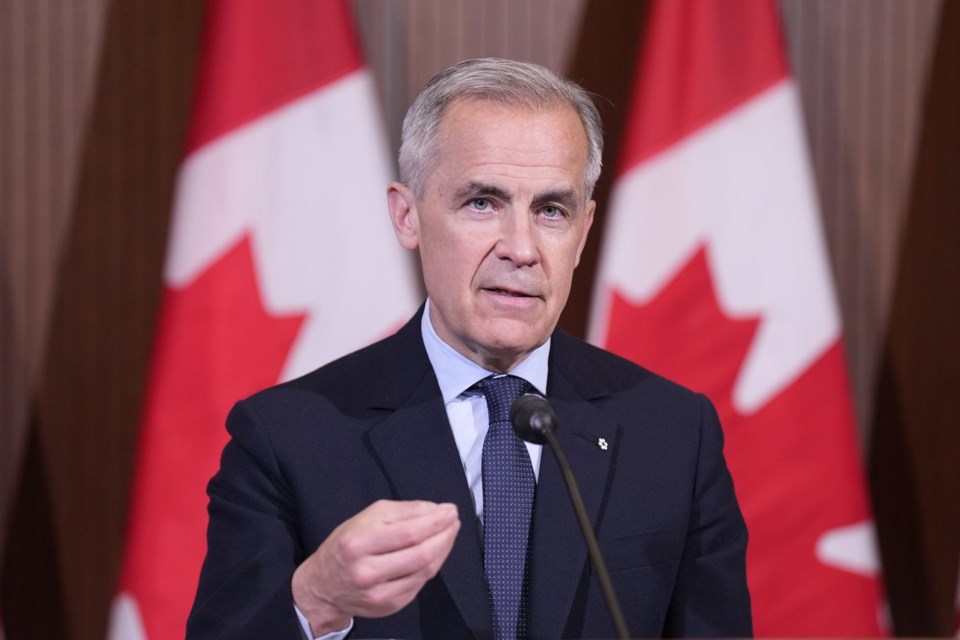OTTAWA — Prime Minister Mark Carney confirmed on Wednesday that Canada is considering joining in U.S. President Donald Trump's new Golden Dome missile defence program.
Speaking with reporters on Parliament Hill, Carney said high-level discussions are underway with the U.S., but he refused to provide a ballpark figure for how much Canada might contribute to the massive undertaking.
"We are conscious that we have an ability, if we so choose, to complete the Golden Dome with investments and partnerships," he said. "It's something that we are looking at and something that has been discussed at a high level, but not I'm not sure one negotiates on this. These are military decisions that have been taken in that context, and we will evaluate it accordingly."
Carney warned that Canada faces potential missiles threats in the "not-too-distant future" that could come from space.
The comments come after Trump said the day before that the Canadian government contacted his administration indicating it wants to join the US$175-billion program and that he will work with Ottawa to ensure it contributes its "fair share."
"Canada has called us and they want to be a part of it," Trump said. "We are dealing with them on pricing. They know about it very much."
If all of this sounds a little familiar, that's because Canada has been at this crossroads before.
Frank McKenna felt a sense of déjà vu on Tuesday when Trump asserted that Canada is interested in buying into the program.
Canada's former ambassador to the U.S. told The Canadian Press that he vividly remembers walking into a committee hearing in Ottawa two decades ago — just as the foreign minister was attempting to warn him on an overseas call that then-prime minister Paul Martin had decided against joining the U.S. in its ballistic missile defence plans.
But McKenna said the call never went through and when he went ahead with the hearing, he declared that Canada was "somewhat involved" in the project — a statement that quickly blew up into a hot-button political issue.
He said it complicated Canada's relationship with the U.S. at the time and stoked heated political debate in Canada.
"Quite frankly, a lot of my staff felt that we should find ways of trying to get to 'yes' with the Americans on some issues because we had so many issues that we were offside on. We were fighting on softwood lumber, we're fighting on other issues," he said.
"My view and the view of my staff was that this would have been an easy one for Canada, but it attracted a lot of hostile public opinion in Canada and became quite toxic."
Fast forward to now, and joining U.S. ballistic defence is on the front-burner again.
"For it to appear that Canada is actually participating in the discussion, I felt somewhat vindicated," McKenna said.
McKenna said Trump's new defence project could help to solve some of Canada's trade woes with the United States, as Ottawa looks to de-escalate tariffs and renegotiate its trilateral trade pact with the U.S. and Mexico.
"We don't need to make a decision yet, but we need to engage and have that conversation," he said. "It should also be part of a broader discussion, not a one-off, so it will be seen by the United States as a concession on our part should we end up participating in the defence shield."
But the head of an Ottawa-based defence think tank said if Canada wants to fully join Trump's "Golden Dome," it should make its decision soon.
"The history of Canada's decision making on missile defence is that we tend to punt decisions and just never make them," said David Perry, president of the Canada Global Affairs Institute. "But if we want to be in and be in fully as this is being shaped and configured, we want to make a decision soon."
Canada contributes to continental defence through Norad by monitoring and detecting threats. But while it can deal with cruise missiles, decisions on shooting ballistic missiles out of the sky are up to the Americans.
Perry said Canada's past heel-dragging on ballistic defence has made it harder to get involved now.
"Why on Earth we didn't do this during the Biden administration is beyond me, which would have been a much better time to have had a discussion about joining with the United States, particularly when we had the president here announcing plans, modernizing Norad," he said.
Perry said that because of Canada's initial "no" to the George Bush administration in 2005, United States Northern Command is the entity responsible for dealing with defeating a missile.
"Our 'no' has complicated the potential involvement of Norad, which would be the more sensible organization to be dealing with all of the issues. But the U.S. can't do that because Canada hasn't wanted to deal for 20 years now with the defence of that one particular missile type," he said.
"I don't know that people just really register how supremely illogical it is to decide that you'd be fine with Parliament getting blown up, so long as it is a particular type of missile that goes boom on the Peace Tower."
This report by The Canadian Press was first published May 21, 2025.
Kyle Duggan, The Canadian Press




